Lukashenko expects industrial co-operation to advance in Russian direction
While receiving Head of the President Administration Dmitry Krutoi and Belarus’ Ambassador to Russia Aleksandr Rogozhnik with a report, President of Belarus Aleksandr Lukashenko underlined that he expects industrial co-operation to advance in the Russian direction
Addressing the Ambassador, Aleksandr Lukashenko said, “I think we’ll meet more than once with you to discuss specifically the issues of your activities as Ambassador to the Russian Federation. It will be easier for you in the sense that Dmitry Krutoi [who worked as Ambassador to Russia before being appointed Head of the President Administration] worked in this position and, as I believe, worked well, mastered those areas of work that will need to be given special attention. However, I really hope that we will have progress primarily on co-operation issues. They lie in the field of industry. I wish there were and should be concrete results here.”

According to the Head of State, in this context, not everything on the Russian market is unambiguous, as we would like.
“You can see that, despite various kinds of sanctions and non-sanctions, the Russian market, especially the niches that were vacated after the departure of certain American and Western companies, are being filled by others. There are enough goods worldwide in these areas. There’s no getting away from it. It has always been and will always be like this in the huge Russian market. Anyway we must not lose our positions in the Russian market, and this is the number one task for you.”
The President pointed out that, as has been said more than once, it is necessary to create multi-brand centres, trading houses, and service centres in Russia in order to service our equipment, which is sold to the Russian market.
“Well, as I say, I mean co-operative relations. You’re well aware of these areas, you’ve worked with them, so it will be easier for you to work in this regard,” the Head of State emphasised again.
Aleksandr Lukashenko noted that Dmitry Krutoi, working as Belarusian Ambassador, constantly visited Russian regions, “He had direct contact with governors, heads of large, medium and small companies. It doesn’t matter which ones. If they are of interest to us, if they contribute to the development of our economy, we need to continue this active communication with regional leaders. You’ve seen and met many of them, so it will be easier for you in this regard.”

The Head of State underlined that it is necessary to continue work in new areas in the aircraft industry, space research, and nuclear energy.
“We’re working on the issue of building the second nuclear power plant. It wouldn’t be a bad thing to have much electric energy. There will never be a surplus of it in the country. You probably understand this better than me. Our industry and households need electricity. Today, electricity [is needed] for consumption by the population. We build electric houses on electric heating: water heating, cooking. We’ve also taken seriously the issue of electric vehicles. This isn’t just the developments; our production is good. This is especially relevant for buses, trams, trolleybuses — electricity is needed everywhere. Therefore, we must look ahead,” Aleksandr Lukashenko stated.
The President summed up that there are a lot of specific programmes, and the Ambassador to Russia has enough authority to implement them.
Aleksandr Lukashenko reminded, “You are Ambassador in the position of Deputy Prime Minister, which raises your status. The Ambassador was specially promoted to Deputy Prime Minister so that you could meet with almost any civil servant in the Government. I think we won’t have any problems agreeing on a candidate. The President of Russia and I usually agree on the candidates.”
Aleksandr Lukashenko said that he intends to discuss this issue with his Russian counterpart in Astana during the upcoming SCO summit, “But that’s a formality, I suppose. He understands perfectly well that such a high-level Ambassador to the Russian Federation is for the benefit of the Union State integration, which you will also have to deal with.”




